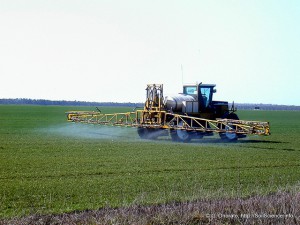Organic crop farming results in less nitrogen loss than conventional crop farming
A recent study published in Agriculture, Ecosystems and Environment has found that organic cropping systems have less nitrogen pollution than conventional cropping systems. Nitrogen pollution occurs in agricultural systems when excess nitrates contaminate groundwater or when the greenhouse gas nitrous oxide is released into the air after fertilizer applications. To determine the extent of nitrogen pollution from these different farming systems, researchers selected five organic and two conventional fields for comparison over a three-year period. Nitrate leaching from the soil was measured by collecting water in buried ceramic cups. The nitrate levels in the collected cups represent the amount of nitrogen left in the water after they passed the depth of plant roots and would likely remain unchanged as it entered the groundwater supply. Nitrous oxide emissions were measured by taking air samples during hours of farm operation. Levels of nitrogen pollution were analyzed and scaled based on the area and yield of each farming system. While nitrogen pollution varied from year to year based on such factors as changes in climate, the overall results showed that when scaled by yield—a more conservative estimate as organic farms typically have lower crop yields than conventional farms, nitrate leaching was still 9% lower in for organic farms and nitrate emissions were 14% lower.



